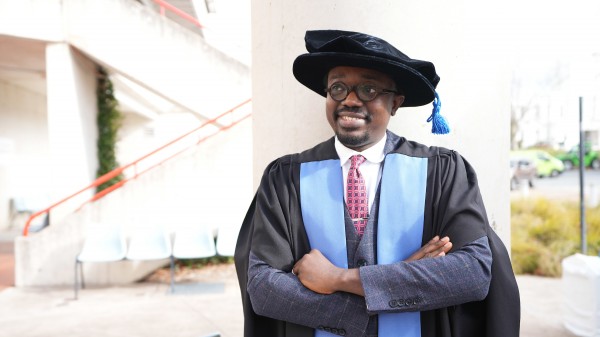The outback GP from ANU
The first thing you notice about Dr Sam Gubicak is he’s on a horse.
Because it’s not every day—nor indeed any day—that an interview subject turns up on horseback.
We had arranged to meet Dr Gubicak south of Tennant Creek, “near the two big mining dishes”. As we drive along, wondering what mining dishes are, and what they look like, we see a man on a horse, waiting on the side of the red, dusty road.
“Wait, is that him there?” I ask. “On the horse?”
Of course it is. It’s Dr Sam Gubicak, alumnus of the ANU Medical School, and now an outback GP, on a horse.
Sitting alongside him are two rough-and-tumble dogs, their tongues hanging impossibly far from their mouths, panting even in the shade.
The horse is a stockhorse which was raised by a nearby Indigenous community and passed on to Dr Gubicak. He has fashioned a bridle for it from rope, but the horse still has the skittishness of an animal which is no longer wild, but not quite domesticated.

One day Dr Gubicak drove along here for the first time, just like we did, having made the journey from Canberra, but where we see dust and isolation and a man on a horse, he saw home. And he does look completely at home in this scene.
He first came to the Northern Territory on a student placement through the ANU Medical School, and then moved to Tennant Creek, over five hours’ drive from Alice Springs, in 2013. He has used it as a base since then, working in a number of even more remote communities.
“I saw there were a lot of challenges,” he says, “but I liked it here.”
“A lot of the communities don’t have stable staffing so I wanted to make an effort to stay put as long as possible. Stability of healthcare is important anywhere.”
He works as a GP at the Anyinginyi Health Aboriginal Corporation which has a clinic in town, and a mobile clinic which travels regularly to the smaller communities located around 100 kilometres of Tennant Creek.
“It’s like a GP but more holistic,” he explains. “I do a lot of health promotion, and improving health literacy.”
After riding back to his house, he shows us leather stock-whips he’s made, and photos from a horse-riding event he organised to improve school engagement in some local Indigenous communities. We meet his chooks, more horses, and get licked by his dogs.

And then he has to get ready for his mobile clinic in the morning. He will pack a four-wheel drive and travel 100 kilometres along roads corrugated with red dust to a remote community of about 30 people. He will see patients with diabetes, hypertension and cardiovascular disease, in an outback version of a house-visit.
I ask him if it made him feel isolated, being so remote, having patients so far away?
“No,” he says, simply.
He doesn’t think it’s novel that he turned up for an interview on horseback. He doesn’t feel any hardship at being here, and why would he? He loves the lifestyle, he says, he loves the landscape, he loves his work, and he loves the community he’s part of.
Follow in Dr Gubicak's footsteps with a Bachelor of Medical Science and a postgraduate medical degree from ANU.








